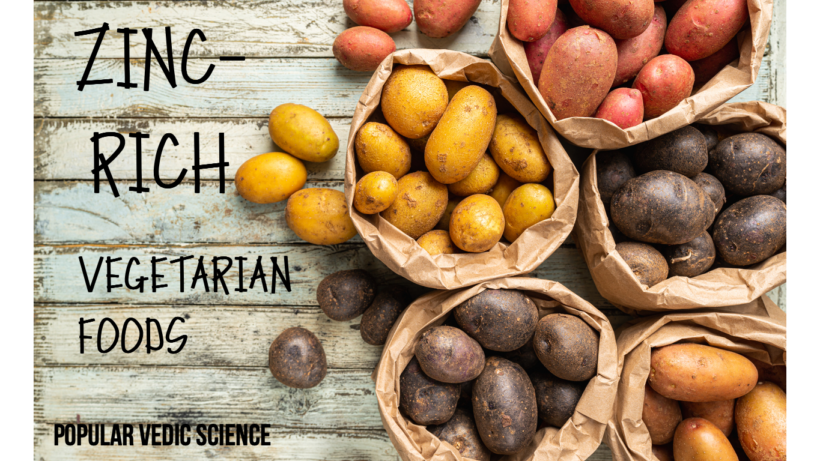
Zinc is a trace mineral found in the human body in quantities second only to iron among the trace elements. It plays an important role in human health with a particular influence on the immune, reproductive, and nervous systems. Because the human body can’t produce or store zinc, you must consume this essential nutrient on a daily basis.
Zinc is especially important to vegetarians for two reasons:
- Many people get zinc from shellfish, beef, and other non-vegetarian foods.
- Phytic acid, a substance found in many plant-based foods, can inhibit zinc absorption.
Yet, you can certainly consume enough zinc from a vegetarian diet with some planning. According to the current recommended dietary allowance (RDA) guidelines for zinc, adult men should consume 11 milligrams while adult women should consume 8 milligrams each day. Read on to learn more about 10 zinc-rich vegetarian foods to help you reach your RDA.
1. Legumes
Chickpeas, lentils, and other beans contain a significant amount of zinc — as well as protein and fiber. That’s why they often play a large role in many vegetarians’ diets. However, legumes also contain phytic acid so your body can’t absorb the zinc they provide as well as zinc from other sources. Sprouting the legumes will help release the phytic acid so you can absorb more of their zinc content.
2. Tofu and Tempeh
These processed, soy-based products provide good sources of both protein and zinc, making them popular with vegetarians. Tempeh is particularly nutrient-dense and protein-rich.
3. Cereals
Food companies fortify most cereals with multiple vitamins and minerals, including zinc. This involves adding a supplement form of zinc to the cereal so eating fortified cereal is similar to eating grains and taking a supplement.
4. Seeds
Seeds represent another good source of zinc, especially the following types:
- Hemp Seeds
- Pumpkin Seeds
- Sunflower Seeds
- Chia Seeds
- Flax Seeds
Seeds also contain phytic acid, which inhibits zinc absorption. Sprouting seeds is one way to ensure you get the full benefit of consuming them.
5. Nuts
Pine nuts, cashews, almonds, Brazil nuts, pecans, and more offer a high zinc content. Like legumes and seeds, you can sprout many nuts to remove their phytic acid and increase your body’s ability to absorb their nutrient content. Nuts also make good sources of protein and omega-3 fatty acids — both important nutrients for vegetarians to consume in the recommended amounts each day.
6. Dairy
Milk is a good source of zinc and cheese is one of the most zinc-filled vegetarian foods available. Dairy items also provide plenty of protein. Many cheeses have a high-fat content, however, so be sure to avoid relying too heavily on dairy products for your zinc, protein and other nutritional needs.
7. Whole Grains
Brown rice has the highest zinc content among whole grains, followed by mixed-grain and whole-grain breads. Grains also contain phytic acid, so remember that your body likely won’t absorb the full amount of zinc listed on the nutrition labels for these items. Despite this, whole grains still help contribute to your total daily intake of zinc.
8. Dark Chocolate
Zinc-rich dark chocolate also contains significant amounts of iron, magnesium, copper, and manganese. Research suggests the consumption of dark chocolate offers multiple health benefits, including lower blood pressure, improved cholesterol levels, improved heart health, and protection against sun damage to your skin.
Given dark chocolate’s generally high sugar and fat content, eat it only occasionally and in small quantities so the potential risks don’t outweigh the benefits.
9. Potatoes
Despite their relatively low protein content, potatoes make a worthy addition to a vegetarian diet. Potatoes are rich in multiple vitamins and minerals, including zinc.
How you prepare a potato impacts its nutritional value, however, with baked and boiled potatoes offering more nutrients than mashed potatoes. A potato’s skin contains most of its vitamins and minerals so leave the skin on to get full benefit.
The U.S. Department of Agriculture Food Composition Databases provide information on the nutritional content of all foods. The Nutrient Search tab allows you to search by nutrient to find which foods contain the most of a specific nutrient while the Food Search tab allows you to search by food product and view the nutrient content of that particular item. Both of these tools can help you ensure you consume enough zinc in a vegetarian diet.
Finally, phytic acid isn’t the only substance that can impair zinc absorption. Iron may also inhibit zinc absorption. If you take an iron supplement, try to eat your zinc-rich foods at a different time than when you take your iron pill. Conversely, protein can improve zinc absorption so eat your zinc-rich and protein-rich foods during the same meals whenever possible.